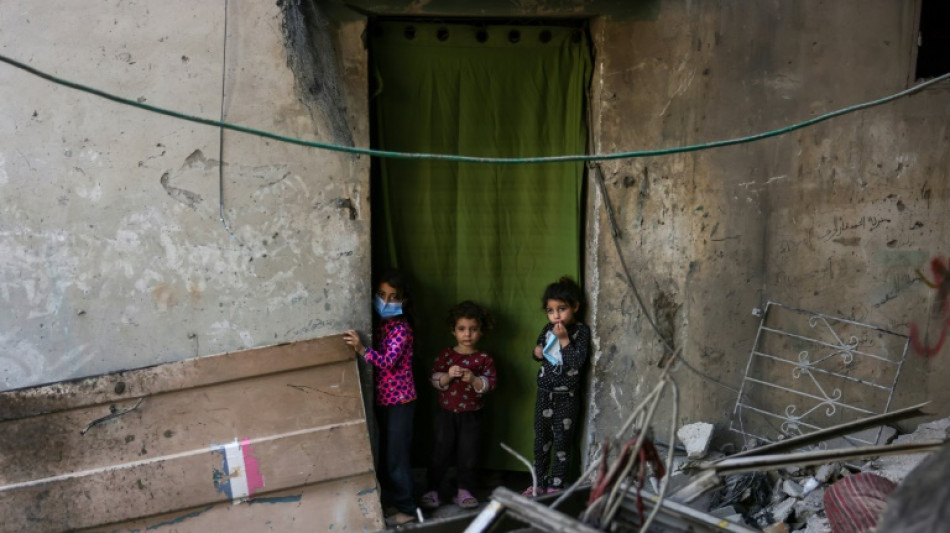Gaza rescuers said at least 80 people were killed in Israeli bombardment across the Palestinian territory on Wednesday, as Israeli Prime Minister Benjamin Netanyahu spoke with US envoy Steve Witkoff about the release of hostages.
Negotiations for the release of the captives held in Gaza have been ongoing, with the latest talks taking place in the Qatari capital Doha, where US President Donald Trump was visiting on Wednesday.
Netanyahu's office said the premier had discussed with Witkoff and his negotiating team "the issue of the hostages and the missing".
Witkoff later said Trump had "a really productive conversation" with the Qatari emir about a Gaza deal, adding that "we are moving along and we have a good plan together".
Fighting meanwhile raged on in Gaza, where the civil defence agency reported that 80 people had been killed since dawn.
"The number of martyrs killed in the ongoing Israeli bombardment of the Gaza Strip since dawn today has risen to 80, including 59 in the northern Gaza Strip," civil defence official Mohammed al-Mughayyir told AFP.
AFP footage from the aftermath of a strike in Jabalia, northern Gaza, showed mounds of concrete rubble and twisted metal from collapsed buildings. Palestinians, including young children, picked through the debris in search of belongings.
Footage of mourners in the north of the territory showed women in tears as they kneeled next to bodies wrapped in bloodstained white shrouds.
"It's a nine-month-old baby. What did he do?" one of them cried out.
Hasan Moqbel, a Palestinian who lost relatives, told AFP: "There are no homes fit for living. I have no shelter, no food, no water. Those who don't die from airstrikes die from hunger, and those who don't die from hunger die from lack of medicine."
- Shortages -
Palestinian President Mahmud Abbas said Wednesday that he favoured a "ceasefire at any price" in Gaza, speaking in the occupied West Bank village of Surda.
Abbas accused Netanyahu of wanting to continue the war in Gaza "for his own reasons".
Mohammad Awad, an emergency doctor in northern Gaza's Indonesian Hospital, told AFP that supply shortages meant his department could not properly handle the flow of wounded from the Jabalia strike.
"The hospital could not accommodate the wounded. There are not enough beds, no medicine, and no means for surgical or medical treatment, which leaves doctors unable to save many of the injured who are dying due to lack of care", he said.
Awad added that "the bodies of the martyrs are lying on the ground in the hospital corridors after the morgue reached full capacity. The situation is catastrophic in every sense of the word."
Israel imposed an aid blockade on the Gaza Strip on March 2 after talks to prolong a January 19 ceasefire broke down.
The resulting shortages of food and medicine have aggravated an already dire situation in the Palestinian territory, although Israel has dismissed UN warnings that a potential famine looms.
A US-led initiative for aid distribution under Israeli military security drew international criticism as it appears to sideline the United Nations and existing aid organisations, and would overhaul current humanitarian structures in Gaza.
- 'Full force' -
Medical charity Medecins Sans Frontieres accused the plan of making "aid conditional on forced displacement" and vetting of the population.
It added in a statement that Israel was creating "conditions for the eradication of Palestinian lives in Gaza".
Israel resumed major operations across Gaza on March 18, with officials later talking of retaining a long-term presence in the Palestinian territory.
Following a short pause in air strikes during the release of US-Israeli hostage Edan Alexander on Monday, Israel resumed pounding Gaza.
Netanyahu said on Monday that the military would enter Gaza "with full force" in the coming days, despite ongoing ceasefire efforts.
He added that his government was working to find countries willing to take in Gaza's population.
The Israeli government approved plans to expand the offensive earlier this month, and spoke of the "conquest" of Gaza.
Of the 251 hostages taken during Hamas's October 2023 attack, 57 remain in Gaza, including 34 the military says are dead. Hamas is also holding the body of an Israeli soldier killed during a previous war in Gaza, in 2014.
The attack resulted in the deaths of 1,218 people on the Israeli side, mostly civilians, according to an AFP tally based on official figures.
Israel's retaliatory offensive has killed at least 52,928 people in Gaza, mostly civilians, according to figures from the territory's Hamas-run health ministry, which the United Nations considers reliable.
Q.Ceulemans--LCdB
